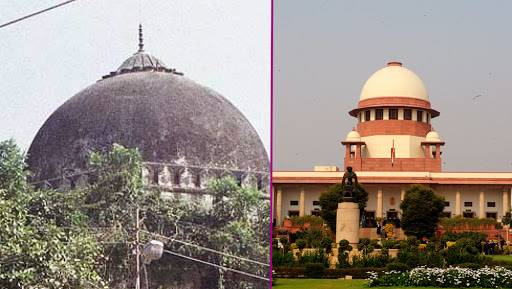New Delhi: A Supreme Court bench — by a 2-1 majority Thursday — declined to refer to a five-judge Constitution bench the plea of a Muslim group to reconsider an observation made by the apex court in a 1994 judgement; a five-judge bench of the Supreme Court had in a 1994 ruling in the context of the Ayodhya land dispute laid down that mosques were not integral to Islam for offering namaz. The appellants claimed the observation in the Ismail Faruqui case had affected the decision of the Allahabad High Court in the land dispute.
The plea came up before the three-member bench headed by Chief Justice Dipak Misra. Justices Ashok Bhushan and S Abdul Nazeer were the other members on the bench. Justice Bhushan, who read out the judgement for himself and the CJI, said the court has to find out the context in which the five-judge bench had delivered the 1994 judgement. “No case has been made out to refer the case to a Constitution Bench,” he however said, while rejecting the plea.
Justice Nazeer, while disagreeing with the two judges on the matter not being referred to a larger bench, said whether mosques were integral to Islam had to be decided based on detailed consideration of religious beliefs. He said the question of the 1994 Ismail Faruqui judgement needed to be referred to a seven-judge bench. In making a case for hearing by a larger bench, he also referred to the recent Supreme Court order on female genital mutilation. The court apex court had referred the pleas seeking a ban on the practice prevalent among the Dawoodi Bora community to a larger, five-judge Bench.
Justice Bhushan said the Allahabad High Court’s finding that a mosque was not integral to Islam was made in the context of land acquisition and that all religions have to be respected equally by the State. He said the Constitution bench judgement was confined to the acquisition of land.
“Observations in Ismail Faruqui case on mosques not being essential to religion was in the context of acquisition of the mosque and made with respect to facts of that case. The observation has to be treated as only an observation and not as the deciding factor of the suit,” Justice Bhushan observed.
The apex court said the civil suit on land dispute will now be heard by a newly constituted three-judge bench October 29 as CJI Misra will retire October 2. The new bench will hear petitions filed by both sides — Hindu and Muslim stakeholders — challenging the 2010 judgement trifurcating the disputed site into three parts for Ram Lalla, Nirmohi Akhara and the original Muslim litigant.
SC quashes plea for larger bench on Ayodhya case
